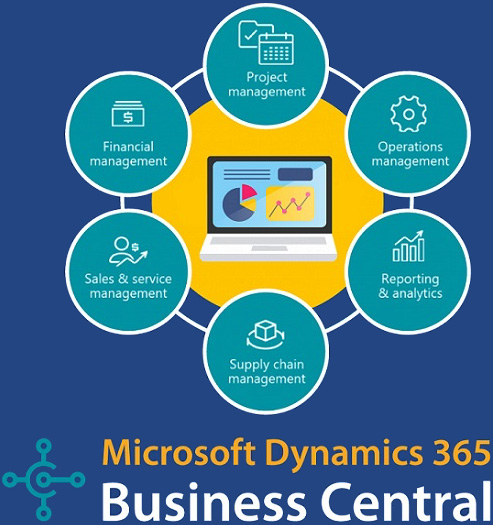When you start your business, you may need fewer employees to meet the customers’ demands. But as the company grows and converts into a mid-size firm, relying on the traditional and manual process will never quench your needs. Your customers may require a speedy delivery mechanism for complete satisfaction. To make your business thrive in the market, a streamlined approach should be adopted to manage finance and other operations.
To overcome such challenges, you need Enterprise Resources Planning Solutions such as Dynamic 365 and Oracle.
With an ample number of options available in the market, it may be challenging for you to pick the right one. Let’s discuss some of the significant differences between these two ERPs to make your work easy.
Microsoft Dynamic 365 Overview
Microsoft launched this next-generation ERP solution in 2016. After its launch, it became a buzzword in the market. This ERP became a helping hand for many sectors like finance, sales, marketing, operations, and customer service. This system is an essential business intelligence tool, as, unlike other ERPs, it is based on the cloud.
Dynamic 365 is also compatible with other Windows applications. For example, according to Dynamics 365 ERP Consulting experts, it is possible to synchronize it with Microsoft Outlook to change sales and inventory quotes through email directly. This massive integrated system has an easy-to-understand and straightforward interface.

Oracle Sales Cloud Overview
This ERP was developed back in 1998 and came up with ERP products like ‘Oracle Sales Online’ and ‘Oracle Marketing Online. However, it catches more audience attention after acquiring Siebel Systems in 2004. Today Oracle has captured a significant share of the overall ERP market. It offers multiple applications to handle service operations and manage sales.
Now let’s have a quick comparison between the ERP’s to give you a broad view of both of them.
Implementation Duration Between Microsoft Dynamics Vs Oracle ERP
Multiple aspects can affect implementation duration. These are business process complications, software and industry type, and the size of the organization.
- Implementation time for Dynamics 365
Planned- 21.4 months
Actual- 24.9 months
- Implementation duration for Oracle
Planned-20.4 months
Actual-23.4 months
Well, both the companies take approx 15% more time than planned time. However, Dynamics 365 takes a little bit more time than Oracle, but not that much.
Project Cost of Microsoft Dynamics 365 and Oracle ERP
The project cost includes the actual system cost along with its customization and implementation
- Dynamic 365- $2.06 Million
- Oracle-$2.05 Million
The result is drawn when prices are compared.
Functionality Achieved
Today, businesses are adopting new systems to boost up profit. Functionality achieved reflects the percentage of companies who have made use of more functionalities of their ERP.
- Dynamic 365-55%
- Oracle- 74%.
Oracle has taken an edge as users can use more Oracles functionalities as compared to Dynamics 365.
Supported Devices
- Oracle- Phone, Live Support, Ticket, and training.
- Dynamics 365- Phone, Ticket
Availability of Language
- Oracle- France, International, USA, Japan, China, Canada, India, Germany, Spain, Portugal, and Italy.
- Dynamics 365-International, USA, Germany, UK, Canada, China, Japan, India, Italy, Russia, Spain, Portugal, Dutch, Turkish, Polish, and Swedish
Key Strength of Oracle ERP and Microsoft ERP
Oracle
- Reputed market leader
- Excellent customer support
- Easy to integrate with MS Office, IBM Notes, Gmail, etc.
Dynamics 365
- Easy to learn
- Easy integration with CRM.
- Supported by advanced Microsoft assets like Cortana Intelligence, Azure, BI tools, etc.

Benefits of Dynamics 365 in the sector of finance and business operation
Manage Inventory: Users can perform ERP Inventory Management and keep track of all inventories in a single database. Check the performance of all the items with their history through this ERP.
Accounts Receivable: Customize the invoice template, add or remove any field in it as per your requirement. Dynamics accounts receivable (AR) automation feature reduces the turnaround time and maintains transparency in supply, customer service, purchase, and inventory process.
Benefits of Oracle ERP
SalesForce Automation: This allows users to perform multiple tasks simultaneously. For example, users can handle partner relationships, sales opportunities, and task and management activity together. Also, users can sync contact tools, email, and calendars with this ERP.
Marketing Automation: User can manage various marketing tasks like manage leads, send bulk emails, and channel marketing campaign optimizations together. Also, users can analyze return over investment.
Reporting and Analysis: Through Oracle Sales Cloud, reporting becomes super easy. Predict your sales revenue through market surveys, marketing trends, and the history of sales data.
Social Network Integration: Through this feature, it becomes easy to reach the target audience and connect with them on social media. This is an excellent approach to avail maximum benefits of social media.
Final Takeaway
All ERPs don’t serve the same purpose. Both Dynamic 365 and Oracle have earned name and fame in the ERP market. Which one should you choose will solely depend upon your requirement and preference. Choosing the suitable ERP is the most significant investment; give it a thoughtful consideration before picking the one. EPCGroup has been providing ERP Consulting to the industry for bringing automation into their business process.










